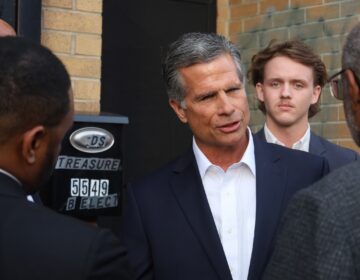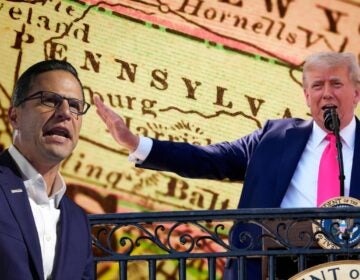Sometimes winning means being smart enough to work together

A puzzle fan works on the New York Times crossword puzzle in pen at the "Wordplay" brunch in Park City, Utah, Sunday, Jan. 22, 2006. (AP Photo/Carolyn Kaster, file)
When I broke my kneecap in June, a good friend sent me the Ultimate Crossword Omnibus, a bible-thick book of puzzles pulled from the pages of the New York Times.
During the oxycodone-blurred days following surgery, I sat in bed, left leg bandaged, braced, and propped at a 45-degree angle, and, along with my partner, Elissa, worked through the first couple of puzzles.
Though I generally take a methodical approach to tasks, my crossword modus operandi is more scattershot: I scan the clues, hip-hopping from “across” to “down,” in search of the things I know for sure.
15 Across: Third Vice President.
Must be Burr. (How many times have I listened to the Hamilton soundtrack?)
57 Across: Nobelist Wiesel.
Elie.
36 Down: Zodiacal border.
Oh, sure: cusp. (In the ’80s, an astrology-obsessed friend did my natal chart.)
52 Down: Robert Indiana painting.
I live in Philadelphia: “Love,” of course!
I felt proud of sifting through my narcotic haze to come up with the name of Hirschfeld’s daughter (Nina) and a Taipan frypan (wok).
But when I finished penciling in the clues I knew, the puzzle still held gaping holes. I scanned again, this time trying to work with the letters I’d already placed. Could “Fitzgerald specialty” be “book?” Nope, because the last of four letters was “T.” Who the hell was the Rumba King or the Apple Computer co-founder? What was a 10-letter term for “hot stuff”?
It was stunning, how much I didn’t know. And after I’d switched from prescription painkillers to Motrin, I couldn’t blame the drugs. What I could do was crowd-source. Elissa curled up next to me with pencil in hand; later, my housemate Megan took a turn. They figured out that “being broadcast” was “on tv,” that “hot stuff” (the thematic clue that appeared four times in this puzzle) was not “melted lava” but “molten lava,” that “Coin in the Trevi, once” had to be “lira.”
We guessed. We hit dead ends. We started from a different corner. We searched for double-entendres and ironic meanings. Once or twice, I confess, we peeked at the answers in the back of the book.
Mostly, though, we relied on our shared, not-always-identical frames of reference. I know poetry and movies; Elissa has a better handle on classical music; Megan’s a copy editor with a storehouse of offbeat mental trivia.
But crossword success demands something more than a lifetime of learned facts. We had to take cognitive risks; we had to be willing to be proven wrong. In the course of any given puzzle, there were moments when I felt certain — even cocky — and then not so sure. What if “Fitzgerald” meant Ella, not F. Scott? Could there be another “letter closing” besides “love”? And what if the “obsolete typewriter necessity” wasn’t “ribbon,” after all?
I thought about our crossword ventures when I read, just the other day, about a Camden County College professor who devised a general knowledge test for her undergraduates. It included questions such as: Who was Dante? In what decade did U.S. women get the right to vote? In what country is the Thames River located?
Whether or not you know the answers to those queries (Italian poet; 1920s; England), you can guess the overall results of the exam. An epic fail: fewer than half the questions were answered correctly, on average.
Can you see the gray heads nodding, an “I told you so” chide in their eyes? Because the students’ performance on this test confirms an easy narrative about their generation, digital denizens who hold the whole Internet in the palms of their hands. It underscores the idea that smart phones have made us stupid.
But I’m wondering if the good professor measured the wrong material. I’m thinking that what matters most today, in a world of exponentially exploding knowledge, isn’t the ability to pluck particular facts from one’s neural circuitry (or swiftly Google them on one’s device of choice), but the capacities that led me and my pals to a completed crossword puzzle — that is, humility, ingenuity, creative (and communal) problem-solving, and sheer persistence.
Sure, I think it’s best if the citizens of a vibrant, functional democracy understand the difference between the Senate and the House of Representatives, know in which century the Civil War occurred and are familiar with cultural idioms and icons: Jesus, Moses, the Mona Lisa (all of which appeared on the Camden professor’s test).
But I’m also aware that my own frame of reference has idiosyncratic borders: I’d score well on an exam of 20th-century American literature, but would wipe out on questions about Japanese history, space exploration, or applied physics. As my 16-year-old frequently reminds me, I know next to nothing about fashion, rap, or the latest trends in social media.
And at a time when the elected occupant of the White House ignores (or simply fires) his advisers, blusters and bluffs his way through meetings, lies and recants and lies again, and seems unclear about the difference between a “call” (such as the one Trump boasted of receiving from the Boy Scouts’ head praising his speech to their national jamboree) and a “conversation” in person following that dubious speech, character surely matters as much as content.
I’d feel safer with a president who’s the smartest person in the room — but that doesn’t mean the guy who thinks he knows everything.
I’d rather have someone at the helm who’s frank about acquired knowledge and its limits: a question-asker and consensus-builder, a courageous, educated guesser who’s also willing to retract and revise, admit failure, seek help, and try again. The beauty of a democracy is that we all get to do those things, each time we enter the voting booth.
Back in that first crossword I attempted? The “obsolete typewriter necessity” wasn’t “ribbon.” It was “eraser.” Of course. If you look closely, you can see where we scrubbed our first idea to make way for the one that worked.
WHYY is your source for fact-based, in-depth journalism and information. As a nonprofit organization, we rely on financial support from readers like you. Please give today.




